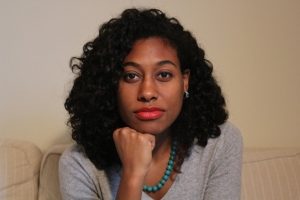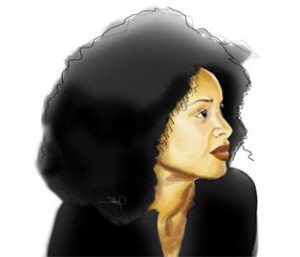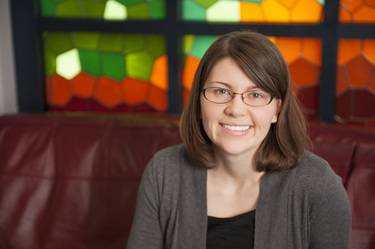You’re a pediatrician and a poet. Did one of those interests arrive first, or do you think of poetry and medicine as different aspects of the same interest?
Pediatrics and poetry arise from the same impulse for me – the desire to connect with other humans in a healing way. I have always been interested in stories, especially those that don’t make it into dominant narratives, and the therapeutic potential of listening to and telling these stories. Practically, as a pediatrician, this means focusing my efforts on helping the kids with the most acute struggles – socially, economically, etc. – not only as their physician but also as a researcher and advocate for systemic change. As a poet, this means writing my truth and hoping that it’s helpful for others, or at the very least that it complicates our national mythological ideas about what it means to be a woman of color.
How did you know you wanted to pursue medicine? What about poetry?
I’ve always known that I would be a writer. Before I could physically write I would dictate things to my mother, and she would write them down in a little black and white Composition notebook for me. I would narrate my parents’ actions aloud and tell myself stories as I fell asleep at night. It was quite annoying. I journaled on a daily basis through most of my childhood and twenties. As I got older poetry seemed to be a more natural way of expressing myself than prose. I also found it easier to jot down a poem in the quiet moments during my hectic medical training than to commit to longer prose projects.
As for medicine, I majored in International Relations in college and got very interested in global public health and in the structural socio-politico-economic causes of health disparities. Although my parents and many of my family members are also physicians, it wasn’t until the end of college that I realized I wanted to be a doctor. I knew that personal relationships with patients and their families would be as important to me as working on public health research or policy, so I decided to go to medical school.
You’ve written elsewhere about how you see the potential overlaps between poetry and medicine, but briefly: how would you convince a skeptic that they are complementary?
I’ll borrow a bit from a blog entry I wrote about this. As a poet, I bend words in odd ways that unearth meanings unsayable in prose. I experiment with phraseologies and diction and the mass and texture and taste of words in juxtaposition with one another. What cannot be communicated through conventional means must be communicated poetically. To identify the voltae around which the moments in our lives turn, and then convert them into something that can be written down is a practice in both observation and translation.
Medicine calls for a surprisingly similar skill set. The particular musicality of blood whooshing past a valve in the heart helps us differentiate an innocent murmur from one that may require surgery. The flicker of an eyelid, the tenor of a baby’s cry, and the feel of a rash on the fingertips hold information that must be translated for their meaning to be communicated. The famous learning objective of a first-year medical resident is to discern “sick or not sick” from the gestalt of a person’s presence, pulse, breath. This is body language. This is the poetry of the body.
Let us imagine that poetry is the translation of the world’s body language. Poetry, for me, is the generation of knowledge, on some level, from our emotions. All poets, then, are diagnosticians and potentially healers. I think that both poets and doctors use particular types of language (poetry, science) to bridge the gaps between sensations (feelings, symptoms) and knowledge. Both answer the question, what does it mean that I/you feel ____?
As physicians, we are faced with malfunctions or different-functions (large or small, temporary or terminal) of the body; some we can help to manage and some we cannot. Regardless of the physical outcome, an important part of our job is to recognize and support the humanity that persists in the face of the body’s change in functioning, the body being our interface with the world and our only truly necessary physical possession as living beings. Perhaps the supporting of humanity, individual or collective, is a core quality of healing in both poetry and medicine.
You’ve also written about the importance of writers and scientists alike nurturing their curiosities about other fields. What do you think best drives that kind of curiosity, either for writers exploring new fields or medical professionals exploring the social sciences and humanities? What do you think the biggest gaps are in the humanities that could be aided by better understanding of science? Vice versa?
I think that most if not all people have varied interests and curiosities. I also think that our educational system sadly does a good job of forcing us to silo our interests into falsely discrete categories – humanities “versus” science, for instance. Unfortunately we don’t all have the time/money/opportunities to explore all of our interests, but in my case I’ve tried not to neglect things that interest me, even if they don’t seem applicable to the task at hand. Because I went to a liberal arts college I was able to take coursework in a wide variety of fields that I saw as complementary. As a busy medical student and now as a resident physician, I explore non-medical topics primarily through reading and taking advantage of arts and cultural events in my city – especially those books and activities that have no ostensible connection to medicine or science. Constant exposure to new ideas and new work keeps me curious and engaged in the world outside the hospital.
The second part of your question is huge. I don’t want to presume what humanities folks know or don’t know about science and vice versa, because certainly there are many, many people who have a foot in both worlds and who understand the gaps and cross-linkages quite well. My general wish is that we can, as a society, learn to let go of the idea that there are limited ways of knowing things, and that some are better than others. I sense that there’s a hierarchy of epistemologies that keeps some people on the margins of what’s considered “legitimate” knowledge production. For instance, quantitative data is extremely useful in epidemiology – but so are stories, and qualitative research in public health doesn’t get nearly the attention/time/funding that I think it deserves. I guess I just want folks to be open to a broader diversity of epistemologies and to the idea that each can be valuable in multiple contexts.
Are you involved with narrative medicine? If so, how do the principles of that field resonate with what you’ve already intuited, as a writer, about the importance of language and storytelling in medicine?
I do narrative medicine to the extent that I sometimes blog about my experiences as a physician, and how they relate to my writing life. I haven’t participated in any formal narrative medicine programs, but I do think there’s a lot for physicians to learn from storytelling. It isn’t only what a patient tells me that’s important; it’s also how she tells me, what she chooses not to tell me, where she pauses, where the silences are. It’s why he’s chosen to tell me this particular story about himself or his child at this particular moment.
Communicating that patient’s story to another provider is also important. How do we paraphrase someone else’s story? What vocabulary do we use to describe our patients, and why? How do our own assumptions, experiences, biases, and fears impact our interpretation of someone else’s story? I’m not sure how the field of narrative medicine tackles these questions, but they’re things I think about a lot.
Your poem “Fear of Causing Pain,” begins with an experience and image unique to a doctor’s work, that of injecting a needle. How often does your clinical experience make it into your work, and how does the act of writing change it for you? Do you ever hesitate to reference more technical medical situations or processes for fear of losing the reader?
“Fear of Causing Pain” is a bit of an anomaly because my clinical experiences don’t usually make it into my work. I write a lot of eco-poetry and poems inspired by articles in the news or things I’ve seen in my travels. I find myself using these themes to write about the root social causes of illness more generally, so my work often draws from current events rather than my clinical experiences. Right now I’m working on a more archival manuscript based on family history. My poetry tends to take a more upstream view of health and illness – that is, how we get to where we are – but I don’t typically write about what goes on in the hospital.
I am an editor for the Humanities section of the Journal of General Internal Medicine, so I do think a lot about others’ use of medical jargon in poetry (and prose). It’s very easy to lose a reader in a jargon-heavy poem, and it’s tempting to write a poem like that when you’re a physician with all this fantastic, odd language at your disposal. The language of medicine is rich and historied; I think as long as it’s used in service of the poem, and not simply for its own shiny sake, it can be additive rather than distracting, but it’s a difficult balance to strike.
Who are some of your favorite doctor-writers or scientist-writers?
I admire Nawal El Saadawi, an 84-year-old Egyptian psychiatrist, writer, feminist, and activist. She has never shied away from confronting injustice with powerful words, a quality I aspire to emulate as a physician-writer myself. Louise Aronson is a physician and writer who’s turned narrative medicine into some really neat short stories. Rafael Campo is a poet and physician who writes not only great poetry, but also some wonderful prose about the connections between medicine and poetry. It’s cliché, but William Carlos Williams is a poetry giant – and also a pediatrician!
What advice would you give to other medical professionals who want to write? To writers who are looking for ways to deepen their knowledge of science?
Read! Read deeply and widely. Read works by people whose experiences you know nothing about. And then write regularly. It’s hard for most medical professionals to find the time and space for an ideal writing practice, so make up a non-ideal writing practice. Write when and how you can, whenever you can. Identify why you are writing (Coping mechanism? Advocacy? To create something beautiful? To make sense of something you feel?) and keep that drive close.
For writers who want to deepen their knowledge of science: go to the scientists themselves. There is a lot of distorted information about science and medicine in the media, so often the best sources for accurate information are professional societies. In the case of medicine, many specialties, hospitals, and clinics have information about a variety of topics written for the non-medical public. If you’re not sure where to find this, ask someone who has a connection the specialty or field that interests you.
Irène Mathieu is a pediatrician, writer, and public health researcher who has lived and worked in the United States, the Dominican Republic, Guatemala, Peru, and elsewhere. She is interested in social determinants of health, global public health, community-engaged research, and medical education.
Irène is the 2016 winner of the Bob Kaufman Book Prize and Yemassee Journal‘s Poetry Prize, and author of the book orogeny (Trembling Pillow Press, 2017) and poetry chapbook the galaxy of origins (dancing girl press & studio, 2014). Irène has received fellowships from the Fulbright Program and the Callaloo Creative Writing Workshop. She is a poetry book reviewer for Muzzle Magazine, an editor for the Journal of General Internal Medicine‘s humanities section, and a contributing author on the Global Health Hub blog. Irène holds a BA in International Relations from the College of William & Mary and a MD from Vanderbilt University.








